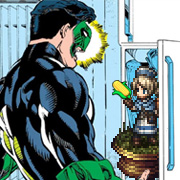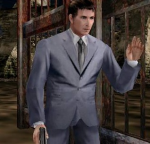|
Good Prose vs. Bad Prose: An Argument "People do not deserve good writing, they are so pleased with bad." ― Ralph Waldo Emerson “When reading a book, one hopes it doesn’t turn into a painful process. Predictable is bad enough. Laborious is acceptable if the labor produces fruit. But with painfully bad writing, all one can do is grab a hatchet, slice off its head, and bury it.” ― Chila Woychik “…After all, it isn't really difficult to write books. Especially if you either write a rotten story in good English or a good story in rotten English, which is as far as most people seem to get nowadays.” ― Dorothy L. Sayers "If a man means his writing seriously, he must mean to write well. But how can he write well until he learns to see what he has written badly. His progress toward good writing and his recognition of bad writing are bound to unfold at something like the same rate." ― John Ciardi  “What is this?” This thread is a battleground for prose. I've seen many discussions in TBB falls apart when someone criticizes an author or book's writing. There seems to be an intellectual impasse that, if a reader enjoys the story, then it is Good. However, there is an important distinction between a book having an entertaining story and having good writing. Every writer (worth reading) spends years developing the Style and Voice in which their stories are told. It is a direct way to objectively examine an author or book's worth. The idea of this thread is to objectively examine books/stories through the writing and debate what makes it good or bad. Instead of making GBS threads up the Stephen King thread trying to explain how Uncle Stevo's story about the clown is cool but the writing is abysmal, we can fight it out here. Instead of making GBS threads up the ASoIaF explaining why GRRM is a hack, we will do it here. Sounds fun, right? You can post a passage from a book and ask “Is this good or is this bad?” You should also assess it yourself. ‘I think this is good/bad,’ should be followed up with why you think it’s good/bad. People are going to ask “Why do you think this is bad, dumbass?” so instead of wasting everyone’s time, post the reasoning behind your opinion. “Hey guys, been looking through this thread and thought I’d get some feedback.” Tread lightly. The intention of this thread isn’t to share and criticize each other’s writing--that is best saved for CC’s various writing threads--but to objectively explore published works. However, if you’re aware of the risk of ridicule and would like to share something you’ve written for the thread's opinion, you may. “The book nerds are being mean!” I say this with love: Thicken your skin, fucker. This is a poo poo-talking subforum on a cynical comedy website. You are being welcomed to participate in the poo poo-talking. It’s okay to admit that something you enjoy is flawed. It’s okay to like literature and genre fiction. It’s possible to like an author or their story and acknowledge that the prose sucks. Attitudes are expected, but please try and focus the vitriol towards the prose and authors, not every goon that participates. Also, if you're going to do lazy short shitposts to insult, please make sure it's actually funny/witty. “What is 'capital-L' Literature?” This is inevitably going to come up in discussion. Please do not poo poo up the thread with shallow questions like “Is Jurassic Park literature?” It comes off as lazy. It’s a topic that can be sincerely discussed, but it isn’t the focus of this thread. We're interested in exploring why Jurassic Park's prose is awkward and choppy, not where it fits in the canon of literature.  Get involved in the argument. Throw out your dumbass opinions. Defend that stupid book you keep reading. Be willing to learn and admit you’re wrong or someone’s right. We are learning through examples and arguments. As of now, I'm keeping the direction of the thread vague so it can build it's own momentum. As it becomes more focused, the OP and next post will be updated as necessary. Franchescanado fucked around with this message at 21:58 on Apr 17, 2018 |
|
|
|

|
| # ? Apr 25, 2024 17:07 |
|
 A Note On Translations If you are posting an excerpt of a story that has been translated from it's original language, please mention the translator. This is incredibly important, because even though they are working from the original text, it is no longer the text. It is an interpretation of the text that has been filtered through a completely different persons writing. There is a reason that there is a new translation of the Odyssey every loving year: every writer misses something in their translation and every writer thinks they can do it right. As of now, feel free to debate and compare the merits of different translations and the work that goes into them. The Elements of Style by Strunk & White -- (free pdf version of 4e) You may have read this book in high school or college. Considered a quintessential 'no bullshit' explanation of the foundations of grammar and prose as a reader and writer. Is it the best? No. It's based on the teachings of a man born in 1869. It remains a quintessential reference point because it is still taught today and much of the advice holds true. And it's short. There seems to be a new edition published every year. Style in Fiction by Geoffrey Leech & Mick Short is a very extensive exploration of stylistic analysis and an academic staple. A fully-indexed PDF with internal hyperlinks can be found here. (Thanks Lex Neville) More Resources and Helpful Definitions coming soon. If you have recommendations or links, resources, books or other information that would fit in an infodump post, please post in the thread or PM me. Franchescanado fucked around with this message at 22:14 on Apr 17, 2018 |
|
|
|
good for what op
|
|
|
|
|
Clipperton posted:good for what op absolutely nothin
|
|
|
|
ready play one, op
|
|
|
|
Clipperton posted:good for what op reading Anyways I am trying to think of some modern readers whose prose has particularly stuck out to me David Vann, obviously. George Saunders, absolutely. One of the big problems is that it is always a challenge to pick out an excerpt that captures the essence of a writer. Good writers are made up as much of moments as they are in the tone and atmosphere that their prose creates. It would be hard to establish just what makes the "What it was like scene" from Aquarium a masterpiece of writing if you experience that scene separate from the narrative and tone already established.
|
|
|
|
Chuck Wendig posted:"The TIE wibbles and wobbles through the air, careening drunkenly across the Myrrann rooftops - it zigzags herkily-jerkily out of sight."
|
|
|
|
It seems like he is just saying the same thing in four different ways
|
|
|
|
The prose is Good if there is a semi-colon.
|
|
|
|
WASDF posted:The prose is Good if there is a semi-colon. A steadfast Anti-Vonneguttean here
|
|
|
|
Mel Mudkiper posted:A steadfast Anti-Vonneguttean here I ain't gonna read hIgH SchOol ""Literature"", now where did I place my Faulkner, and where'd that DeLillo go? Edit: I will contribute two small examples of prose. quote:And suddenly the idea comes into your head that perhaps now, at this very moment while you are passing by, in one of the rooms behind those drab shutters, at a worm-eaten desk, among bundles of papers tied up with red or green tape, with scratchy old-fashioned penstrokes, your fate is being inscribed. quote:When everything's said and done, unfortunately, we find ourselves in the position of children whose parents have gone to the theatre, leaving them alone in the dark house. Yes, we are forced, if we are honest, to make the saddest of all admissions when it comes to the last resort: Alas, we do not understand these things. WASDF fucked around with this message at 03:34 on Apr 17, 2018 |
|
|
|
wait wait i got this It was a silence in three parts
|
|
|
|
|
William Gass' last novel had as, basically it's only plot point, him kicking around a sentence about how we wants everyone to die.
|
|
|
|
Mr. Squishy posted:William Gass' last novel had as, basically it's only plot point, him kicking around a sentence about how we wants everyone to die. He was cool
|
|
|
|
This one definitely satisfies the "lots of semi-colons" condition. From probably my favorite short story ever, the first page of Jackals and Arabs by Kafka: -- We were camping in the oasis. My companions were asleep. The tall, white figure of an Arab passed by; he had been seeing to the camels and was on his way to his own sleeping place. I threw myself on my back in the grass; I tried to fall asleep; I could not; a jackal howled in the distance; I sat up again. And what had been so far away was all at once quite near. Jackals were swarming around me, eyes gleaming dull gold and vanishing again, lithe bodies moving nimbly and rhythmically, as if at the crack of a whip. One jackal came from behind me, nudging right under my arms, pressing against me, as if he needed my warmth, and then stood before me and spoke to me almost eye to eye. "I am the oldest jackal far and wide. I am delighted to have met you here at last. I had almost given up hope, since we have been waiting endless years for you; my mother waited for you, and her mother, and all our foremothers right back to the first mother of all the jackals. It is true, believe me!" "That is surprising," said I, forgetting to kindle the pile of firewood which lay ready to smoke away jackals, "that is very surprising for me to hear. It is by pure chance that I have come here from the far North, and I am making only a short tour of your country. What do you jackals want, then?" As if emboldened by this perhaps too-friendly inquiry the ring of jackals closed in on me; all were panting and openmouthed. "We know," began the eldest, "that you have come from the North; that is just what we base our hopes on. You Northerners have the kind of intelligence that is not to be found among Arabs. Not a spark of intelligence, let me tell you, can be struck from their cold arrogance. They kill animals for food, and carrion they despise." "Not so loud," said I, "there are Arabs sleeping nearby." "You are indeed a stranger here," said the jackal, "or you would know that never in the history of the world has any jackal been afraid of an Arab. Why should we fear them? Is it not misfortune enough for us to be exiled among such creatures?" "Maybe, maybe," said I, "matters so far outside my province I am not competent to judge; it seems to me a very old quarrel; I suppose it's in the blood, and perhaps will only end with it." "You are very clever," said the old jackal; and they all began to pant more quickly; the air pumped out of their lungs although they were standing still; a rank smell which at times I had to set my teeth to endure streamed from their open jaws, "you are very clever; what you have just said agrees with our old tradition. So we shall draw blood from them and the quarrel will be over." -- This first page gives all these really groovy, teasing adumbrations of what's to come later in the story, especially how the jackals are moving "as if at the crack of a whip." Also significantly, the Northerner expresses no surprise that the jackals can speak, but rather maintains as far as he's able a non-committal stance. Both of these details communicate to the reader right away that we're dealing with something beyond the real world. It says to the reader: "Watch carefully; this may be something like a fable. There's more at stake than what's literally happening." There's also an immediacy to this passage that I just love; the sudden, uncomfortable proximity of the jackals and their odd attitude, both obsequious and insistent, and the overall calculated, economic prose of the work, all combine to let the reader share in the Northerner's claustrophobia and bewilderment at the jackals' bizarre prophecies. The jackals also are established as being somewhat ignorant about the Northerner, seeming to assume that it's Arabs in particular that stupidly "despise carrion." Having established jackals as unreliable early in the story, the reader is even more alert to what false impressions the jackals will have in the future, and will probably question everything they say. I think this 4-5 page story really shows how effective Kafka can be at almost forcing a reader to do a close read of the work. -- Here's the end. Spoilers or whatever: Four men came up with the heavy carcass and threw it down before us. It had hardly touched the ground before the jackals lifted up their voices. As if irresistibly drawn by cords each of them began to waver forward, crawling on his belly. They had forgotten the Arabs, forgotten their hatred, the all-obliterating immediate presence of the stinking carrion bewitched them. One was already at the camel's throat, sinking his teeth straight into an artery. Like a vehement small pump endeavoring with as much determination as hopefulness to extinguish some raging fire, every muscle in his body twitched and labored at the task. In a trice they were all on top of the carcass, laboring in common, piled mountain-high. And now the caravan leader lashed his cutting whip crisscross over their backs. They lifted their heads; half swooning in ecstasy; saw the Arabs standing before them; felt the sting of the whip on their muzzles; leaped and ran backwards a stretch. But the camel's blood was already lying in pools, reeking to heaven, the carcass was torn wide open in many places. They could not resist it; they were back again; once more the leader lifted his whip; I stayed his arm. "You are right, sir," said he, "we'll leave them to their business; besides, it's time to break camp. Well, you've seen them. Marvelous creatures, aren't they? And how they hate us!" -- The descriptions here are just amazing to me in their economy and evocative power. The narrator is finally allowed a pittance of agency, and the reader is left to wonder what it all means. Bam.
|
|
|
|
I am admittedly a fanboy, but I always thought that Ursula K Le Guin, at her best, writes some of the most beautifully sparse and spare prose at times. She doesn't always get it right, but when she does it is goddamn spectacular. I recall one writer comparing her prose to having the same economy of expression (I think is what he said or some such) as the best parts of the King James bible, which I thought was an interesting compliment. I think her best prose is perhaps exemplified in the Earthsea books, primarily the initial trilogy she wrote back in the '70s. I would say that 'The Other Wind' is the only book of the "second trilogy" that can stand with those books, and then she relies on nostalgia probably a bit too much, but it helps that the concepts are so fresh and she has such a good grasp of how to tell a good fantasy story and how to turn pacing and expectation to her advantage. The way she handles the journey of her titular hero from the first book into the sixth is frankly masterful, even if things got a little messy and unpleasant in Tehanu, the same can be said of life. That bookdealt very much about some of the messy unpleasantness of life and of being a woman, and is probably misunderstood and underappreciated for what it is.. Anyway. I also would speak very highly of her prose in the Hainish Cycle, though I do not believe it as consistent and pure as her prose in the first Earthsea trilogy. The Hainish books are more of a loose collection than a proper series in the manner of Earthsea. I just feel like the evident simplicity of her prose leaves so much room for one's imaginations to fill in the details. There are parts of the Earthsea books or Left Hand of Darkness which I recall as a vividly detailed scene, but when I go back and find the 'scene' it turns out to be a sentence or two. My imagination had just extrapolated a great deal over the years. I always think there's no replacement for listening to an author read their own prose aloud, so here is Ursula reading from Chapter 1 of A Wizard of Earthsea; she stops and talks a bit and continues to read various other selections, but the part of the first chapter she reads is only like 8 minutes long, so please stick around for that.. I suppose for people unfamiliar, this was the first book someone wrote that was a coming of age tale involving a school for wizards, but it has nothing to do with another popular series about a Wizard School and is an entirely different novel that's incomparable to it - it'd be like comparing apples and.... uh, black pudding with beans and sausage https://www.youtube.com/watch?v=i6KrU84CPKE&t=652s kaworu fucked around with this message at 17:17 on Apr 17, 2018 |
|
|
|
Ceramic Shot posted:about Willa and Edwin Muir's translation of "Schakale und Araber". I'll disclose that I translate so I suppose I might catch some poo poo for this, but: I'm of the opinion that, in a thread in which the quality of prose is centralised, we should mention the translator(s) whose work is cited if applicable. We all know the same passages are often handled entirely differently by different translators, so I'd say it's fair to credit the translators whose prose we think is good. WASDF posted:And suddenly the idea comes into your head that perhaps now, at this very moment while you are passing by, in one of the rooms behind those drab shutters, at a worm-eaten desk, among bundles of papers tied up with red or green tape, with scratchy old-fashioned penstrokes, your fate is being inscribed. This one is intriguing to me because I'm curious as to what surrounds this bit but at the same time the only thing off which I can really go here is the form and, to me, this kind of zooming-in technique is overused to the point where it's often detrimental. Here, all it really does is add artificial gravity to the end of the sentence; we're supposed to take the author's word for it that "your fate being inscribed" is definitely very significant. Of course, I'm not aware of the context in the slightest but none of the things mentioned appear to add to that significance. It reads like a literary 'wait for it...'. As for some passages, here are two from Joyce's Portrait that I believe offer (relatively) succinct insight into how well Joyce managed to portray Stephen's coming-of-age, not just by way of the content but also through form. They're both passages in which Stephen is extremely anxious and, while Stephen's focalisation has matured immensely between these two passages, his nervous tendencies still shine through. For instance, the use of repetition, a lack of or sloppy punctuation, the recurring introspection, his self-encouragement, even the fact that his quickly turning right in the first passage and his walking blindly into the box in the second surprise the reader; nearly all remain, but they have all become much less disjointed. A Portrait of the Artist as a Young Man, part I posted:It was easy what he had to do. All he had to do was when the dinner was over and he came out in his turn to go on walking but not out to the corridor but up the staircase on the right that led to the castle. He had nothing to do but that: to turn to the right and walk fast up the staircase and in half a minute he would be in the low dark narrow corridor that led through the castle to the rector's room. And every fellow had said that it was unfair, even the fellow out of second of grammar who had said that about the senate and the Roman people. A Portrait of the Artist as a Young Man, part III posted:His blood began to murmur in his veins, murmuring like a sinful city summoned from its sleep to bear its doom. Little flakes of fire fell and powdery ashes fell softly, alighting on the houses of men. They stirred, waking from sleep, troubled by the heated air. So yeah, I think that is good prose. I hope citing Joyce isn't considered too easy of a slam-dunk in this thread, but at the same time - at any time - I refuse to subscribe to the notion that "Joyce doesn't count". Lex Neville fucked around with this message at 15:09 on Apr 18, 2018 |
|
|
|
Lex Neville posted:I'll disclose that I translate so I suppose I might catch some poo poo for this, but: I'm of the opinion that, in a thread in which the quality of prose is centralised, we should mention the translator(s) whose work is cited if applicable. The same prose is often handled in entirely different ways by different translators so I'd say it's fair to credit the translators whose prose we think is good. Differences in translations are an important aspect in this debate. I'll add a note in the OP about mentioning translators.
|
|
|
|
Mel Mudkiper posted:reading David Vann is one of the few authors I enjoy that writes in the "minimal prose" style (if there's a better definition, please correct me) that predominates current prose trends. I generally find that style very detached (which can be good for certain stories; Colson Whitehead's The Underground Railroad is a prime example), cold, and boring. An example: My book club recently read 'Hunger' by Roxane Gay, which also shares a minimal detached voice. There are moments in her memoir where I think that voice is the best suited for the subject, specifically when she is recounting the trauma of being gang raped as a child. It's traumatic and painful and the minimal style emphasizes that the only way she can share this moment with the reader is because of this detached voice. However, it hurts the book when she is trying to explain some of the more mundane problems of being overweight--such as being unable to fit in an airplane seat or shopping for jeans. It's just devoid of any character. The detachment made me feel bored. We compared it to several other memoirs, stuff like Augusten Burroughs and David Sedaris, who manage to maintain the personality of the narrator equally throughout the trauma while still keeping the prose direct.   Hunger by Roxane Gay Back to Vann: with his book Aquarium, he manages to maintain a minimal voice and tell a disturbing story of trauma from the perspective of the teenage victim. It never sacrifices the personality of the narrator or the actual prose. It manages to be descriptive and also direct. I'm a slow reader, and I was able stay engaged with the story and writing to finish it in two sittings.  Aquarium by David Vann Just comparing the two, Vann's economy makes every description hit harder. There's a rhythm with the words and even the formatting. It feels like the narrator is letting us hear their thoughts and peek into their world, whereas Gay's book feels almost like I've cajoled her into telling me her story. It feels defensive. I wish I could focus and articulate this point further. It's also interesting that popular fiction is embracing Gay's writing style more and more, and seems to be reaching ridiculous (almost self-parody) levels, like Rupi Kaur and Nikita Gill and other "instagram poets"(and I'll explore this more in a future post). The last few books I've read have all been in a minimal style and it's just wearing on me. I've started looking into why some minimal prose works for me and why others don't. It's one of the reasons I made this thread.
|
|
|
|
Franchescanado posted:The Elements of Style by Strunk & White -- (free pdf version of 4e) Not short but by him, in part: Style in Fiction by Geoffrey Leech & Mick Short is a very extensive exploration of stylistic analysis and an academic staple. A fully-indexed PDF with internal hyperlinks can be found here.
|
|
|
|
.
whatevz fucked around with this message at 03:43 on Apr 25, 2022 |
|
|
|
Lex Neville posted:This one is intriguing to me because I'm curious as to what surrounds this bit but at the same time the only thing off which I can really go here is the form and, to me, this kind of zooming-in technique is overused to the point where it's often detrimental. Here, all it really does is add artificial gravity to the end of the sentence; we're supposed to take the author's word for it that "your fate being inscribed" is definitely very significant. Of course, I'm not aware of the context in the slightest but none of the things mentioned appear to add to that significance. It reads like a literary 'wait for it...'. It is from one of Kavan's later books, Sleep Has His House, which is sort of a surreal bildungsroman of herself that reads like Virginia Woolf's The Waves. That part in particular is difficult for me to place in the pseudo events of the story, but I think it is alluding to a part in her life when she has aged into, or just about adulthood and is referring to a kind of bureaucratic paranoia, or determinism that shapes and guides life at that stage. But I think your criticism rings true, regarding that zooming thing. Even though I usually like it, and give it a pass for books from the 20th century, I would think it's a little played by the 21st century. The book is very interesting, but it's less about plot and more experiential, so I can't say that this moment in particular actually has the significance that "your fate being inscribed" implies. I would recommend reading it nonetheless, and her more popular book, Ice, too!
|
|
|
|
pleasecallmechrist posted:“Cammed each night out of that safe furrow the bulk of this city’s waking each sunrise again set virtuously to plowing, what rich soils had he turned, what concentric planets uncovered? What voices overheard, flinders of luminescent gods glimpsed among the wallpaper’s stained foliage, candlestubs lit to rotate in the air over him, prefiguring the cigarette he or a friend must fall asleep someday smoking, thus to end among the flaming, secret salts held all those years by the insatiable stuffing of a mattress that could keep vestiges of every nightmare sweat, helpless overflowing bladder, viciously, tearfully consummated wet dream, like the memory bank to the computer of the lost?” (102). That part from TCoL49 is also one of my most cherished examples of Pynchon's writing. It's beautiful, and in the moment has so much significance.
|
|
|
|
kaworu posted:Ursula K Le Guin same. So does a stingy economy of word really define good prose though? Most of the books I've read of hers are from the limited third person, and it makes sense to get the main characters limited view across, using limited words. Does an omniscient voice need to say more? Does first person need fewer? I think most of what we see as bad prose is inappropriate word economy for the voice the author is using. My guilty pleasure currently is the Dresden Files. First person voice, and every action, or romantic scene is over explained; overly flourished. For the first 4 books I gave it a pass because I thought it was an homage to pulp mysteries, but after reading another one of Butcher's novels I have my doubts. But then how much should a reader be expected to fill in? I'm reading Jane Austen now, and it is frustrating without certain cultural cues that her contemporary would have known since childhood. Can good prose become bad prose over time?
|
|
|
|
Lex Neville posted:...we should mention the translator(s)... My copy says Translated by Willa and Edwin Muir actually. It's funny you mentioned the translation because when I went to look up the story online (Johnston's version) something seemed off about it to me and I just typed it out of my book instead. Translations matter! I have the collection from amazon with the foreword by John Updike.
|
|
|
|
I always wrestle with how to consider prose in translation because some of my favorite stylists I have read in translation. Yasunari Kawabata and Jose Saramago stick out particularly
|
|
|
|
Speaking of translations, I still remember encountering the word lugubrious for the first time in Oe Kenzaburo's A Personal Matter and feeling both suspicious and admiring that the translator seemed to have a voice all their own. Maybe it's more pronounced in really different languages like English/Japanese.
|
|
|
|
Ceramic Shot posted:Speaking of translations, I still remember encountering the word lugubrious for the first time in Oe Kenzaburo's A Personal Matter and feeling both suspicious and admiring that the translator seemed to have a voice all their own. Maybe it's more pronounced in really different languages like English/Japanese. lol if this isn't where you first heard the word lugubrious https://www.youtube.com/watch?v=DivvcAD1-60
|
|
|
|
Richard Powers's The Gold Bug Variations is the most gorgeous book I've ever read, but I don't have it with me right now and don't have the wherewithal to bumble around with the Surprise Me! button until I run into a particularly good bit.
|
|
|
|
Sham bam bamina! posted:Richard Powers's The Gold Bug Variations is the most gorgeous book I've ever read, but I don't have it with me right now and don't have the wherewithal to bumble around with the Surprise Me! button until I run into a particularly good bit. Richard Powers is a master I am a fan of The Echo Maker personally
|
|
|
|
Ceramic Shot posted:My copy says Translated by Willa and Edwin Muir actually. It's funny you mentioned the translation because when I went to look up the story online (Johnston's version) something seemed off about it to me and I just typed it out of my book instead. Translations matter! I have the collection from amazon with the foreword by John Updike. poo poo. My bad. I corrected my previous post. Thanks! Mel Mudkiper posted:I always wrestle with how to consider prose in translation because some of my favorite stylists I have read in translation. I'm curious to hear how you (and others) tend to end up dealing with this, if at all. For instance, I'm familiar to varying extents with the oeuvres of many translators in my country, so I'll often end up buying works from authors I don't know simply because the translator is reputable - or I'll read both the source text as well as the translation when I can - but how (much) do others differentiate between the two? How much of what makes translated prose either good or bad do you ascribe to either party? Lex Neville fucked around with this message at 15:42 on Apr 18, 2018 |
|
|
|
Mel Mudkiper posted:I always wrestle with how to consider prose in translation because some of my favorite stylists I have read in translation. an obvious contender to this dilemma is Sphinx by French author Anne Garreta. her project was to write a novel without gender, and the way she did it was to abolish grammatical gender all together (by going for verbs, phrases, nouns and so forth that were in Neutrum or otherwise non-gendered), and this obviously materializes in vastly different ways in the original language compared to an English translation.
|
|
|
|
Wait, this is also a thread about bad prose. I choose The Worst Book: Jonathan Safran Foer's Extremely Loud and Incredibly Close. I've never stifled my laughter harder in a book store than when I challenged my brother to make it through the first page of that horseshit.
|
|
|
|
Confession: I think Fitzgerald has terrible prose
|
|
|
|
kaworu posted:Ursula K Le Guin, For some reason this particular bit by Ursula K Le Guin has lodged itself in my memory: quote:There was a wall. It did not look important. It was built of uncut rocks roughly mortared. An adult could look right over it, and even a child could climb it. Where it crossed the roadway, instead of having a gate it degenerated into mere geometry, I think I just really like the phrase "degenerated into mere geometry"
|
|
|
|
Mel Mudkiper posted:Confession: I think Fitzgerald has terrible prose You've brought this up several times in various threads. I like his prose, but I've really only read Gatsby. I'm interested in some examples of why you think it's terrible. Sham bam bamina! posted:Wait, this is also a thread about bad prose. I bought this book from the thrift store before I knew it was bad. I don't like throwing away books, I'd rather donate them or something, but no one wants the drat thing. I may do a write-up on the first page, though.
|
|
|
|
American Gods is the worst book I've read in recent memory
|
|
|
|
Franchescanado posted:You've brought this up several times in various threads. I like his prose, but I've really only read Gatsby. I'm interested in some examples of why you think it's terrible. Well, take the first page or so of Great Gatsby. I will highlight sentences and clauses that I have issues with. Most of it falls into two categories, needlessly purple prose and atonal sentence structure. quote:In my younger and more vulnerable years my father gave me some advice that I’ve been turning over in my mind ever since. I find the opening sentence of Great Gatsby to be painfully atonal. It sounds ugly. The first two clauses, when spoken with a natural inflection, have the stressed focus word on the end of the clause. Thus, the first two sentences build up to a final stress like a curve. However, the third clause had the stressed focus near the beginning of the clause. Therefore, when read aloud, the third clause clashes tonally with the first two. You can certainly read the third clause in a way that harmonizes with the first two clauses, but then you lose all sense of natural diction, with is important in a first person narrative. A lot of his other sentences suffer from unnecessary modifiers. Nearly every noun has an adjective. Nearly every verb has an adverb. It ends up making the text feel dense and literary, but it doesn't make the text more meaningful. You could remove nearly all modifiers from most of the highlighted sentences and not actually change the meaning of the sentence, or there is a more specific word that means what the adj/n or adv/v combination means. That means those added words are little more than window dressing. fridge corn posted:American Gods is the worst book I've read in recent memory I wouldn't call it bad as much as I would call it not nearly as clever as it thinks it is Mel Mudkiper fucked around with this message at 16:43 on Apr 18, 2018 |
|
|
|
Mel Mudkiper posted:
Tbh I wasn't paying much attention to the quality of the prose when I read it other than the fact that he seemed to be trying to write a comic book with it
|
|
|
|

|
| # ? Apr 25, 2024 17:07 |
|
fridge corn posted:Tbh I wasn't paying much attention to the quality of the prose when I read it other than the fact that he seemed to be trying to write a comic book with it I was just referring to the book in general. The whole thing reads like its trying to award readers for getting the references. A mythological Ready Player One.
|
|
|
























